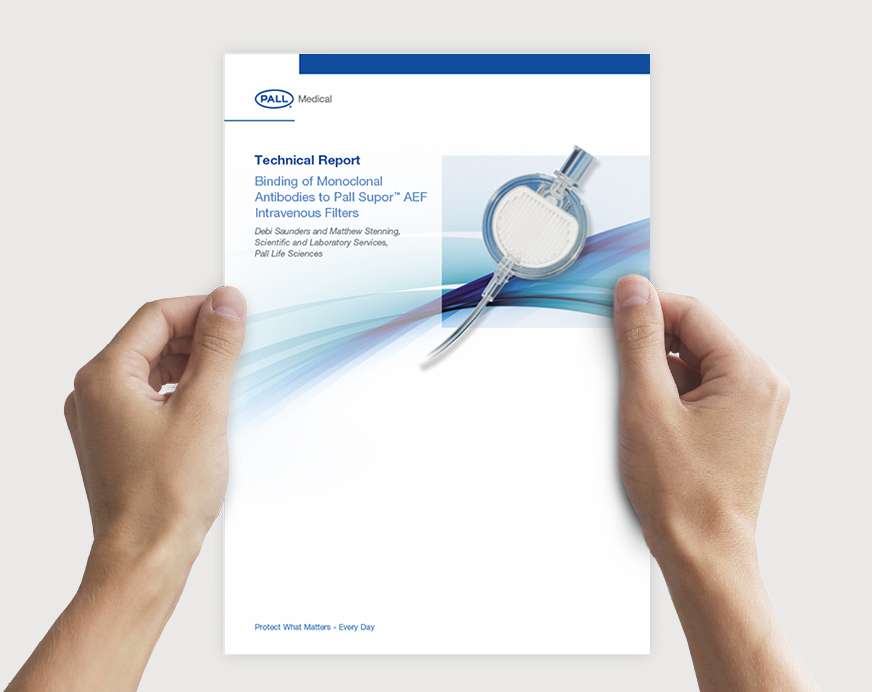
Managing Risk of Particle Contamination in Monoclonal Antibody Therapies: IV Filters
Our IV In-Line Filters are an Effective Solution in the Removal of Particulate Contaminants with Low Protein Binding Performance for Coronavirus Treatments and more
Over the last 10 years monoclonal antibodies have evolved into the best-selling drugs in the pharmaceutical market.1 At present more than 100 monoclonal antibody drugs are approved in the United States and the Europe.2 Monoclonal antibodies are effective drugs to treat a variety of diseases, including cancer. Currently, monoclonal antibodies are under investigation for the treatment of patients infected by the newly discovered coronavirus SARS-CoV-2.
Two of these antibody treatments already received emergency authorization from the FDA to treat COVID-19 patients.3,4 The Instructions for use (IFUs) for both products in the United States clearly recommend the use of polyethersulfone (PES) filters.5,6
Formation of Protein Particles in Antibody Therapies: Risk of Immunogenicity
Even with all the current knowledge available today, it is nearly impossible to absolutely exclude the formation of protein particles in monoclonal antibody formulations, however protein particles are critical in terms of potentially stimulating negative immune responses.7,8 Immune responses associated with potential adverse clinical effects include:
- the generation of neutralizing antibodies that inhibit the efficacy of the product and
- the generation of antibodies that cross-reactively neutralize an endogenous protein.7,8
Supor™ Polyethersulfone (PES) Membrane Filters are Our Solution for Particle Retention with Low Protein Binding
Our IV in-line filters have been shown to be effective in the removal of particles within ICU settings and while being used for the application of protein-based drugs, including cytokine drugs, enzyme drugs, hormone drugs and antibody drugs.8,9
A concern with IV filters is that monoclonal antibodies could potentially bind to the membrane and ultimately be retained by the filter. As a proof of principle for the performance of our low protein-binding PES membrane filters, the Pall Technical Report “Binding of Monoclonal Antibodies to Pall Supor™ AEF Intravenous Filters” illustrates negligible binding of antibodies to the filter membrane.
As the market for monoclonal antibody therapies treating a variety of diseases grows globally and in the current situation more products receive emergency use authorization to combat COVID-19, treating staff and medical device companies must choose the right in-line filters for their intravenous application.
Our Filters Provide Supor™ PES Membrane:
- OEM AEF Filter
- OEM IV-5 Filter
- Pall Supor AEF Filter (510(k), CE Mark)
For more detailed information download the Pall Technical Report “Binding of Monoclonal Antibodies to Pall Supor™ AEF Intravenous Filters”
References
- Lu R.M. (2020). Development of therapeutic antibodies for the treatment of diseases. Journal of Biomedical Science; 27 (1)
- Antibody Society (2021). Antibody therapeutics approved or in regulatory review in the EU or US. [Online]. Available at: https://www.antibodysociety.org/resources/approved-antibodies/ (Accessed: 6 April 2021)
- FDA (2020). Coronavirus (COVID-19) Update: FDA Authorizes Monoclonal Antibodies for Treatment of COVID-19. [Online]. Available at: https://www.fda.gov/news-events/press-announcements/coronavirus-covid-19-update-fda-authorizes-monoclonal-antibodies-treatment-covid-19 (Accessed: 6 April 2021)
- FDA (2020). Coronavirus (COVID-19) Update: FDA Authorizes Monoclonal Antibody for Treatment of COVID-19. [Online]. Available at: https://www.fda.gov/news-events/press-announcements/coronavirus-covid-19-update-fda-authorizes-monoclonal-antibody-treatment-covid-19 (Accessed: 6 April 2021)
- FDA (2020). Fact Sheet For Health Care Providers Emergency Use Authorization (EUA) of Bamlanivimab. [Online]. Available at: https://www.fda.gov/media/143603/download (Accessed: 6 April 2021).
- FDA (2020). Fact Sheet For Health Care Providers Emergency Use Authorization (EUA) of Casirivimab and Imdevimab. [Online]. Available at: https://www.fda.gov/media/143892/download (Accessed: 6 April 2021)
- Nabhan M., Pallardy M. and Turbica I. (2020). Immunogenicity of Bioproducts: Cellular Models to Evaluate the Impact of Therapeutic Antibody Aggregates. Front Immunol; 11 (275): 1-9
- Werner B.P., Winter G. (2018). Expanding Bedside Filtration - A Powerful Tool to Protect Patients From Protein Aggregates. Journal of Pharmaceutical Sciences; 107: 2775-2788
- Perez M. et al. (2018). Effectiveness of in-Line Filters to Completely Remove Particulate Contamination During a Pediatric Multidrug Infusion Protocol. Sci Rep; 8 (1): 7714.
